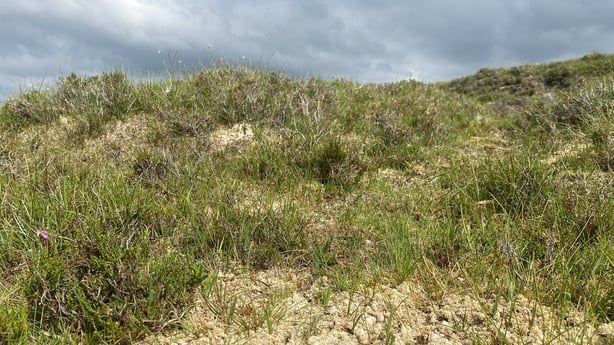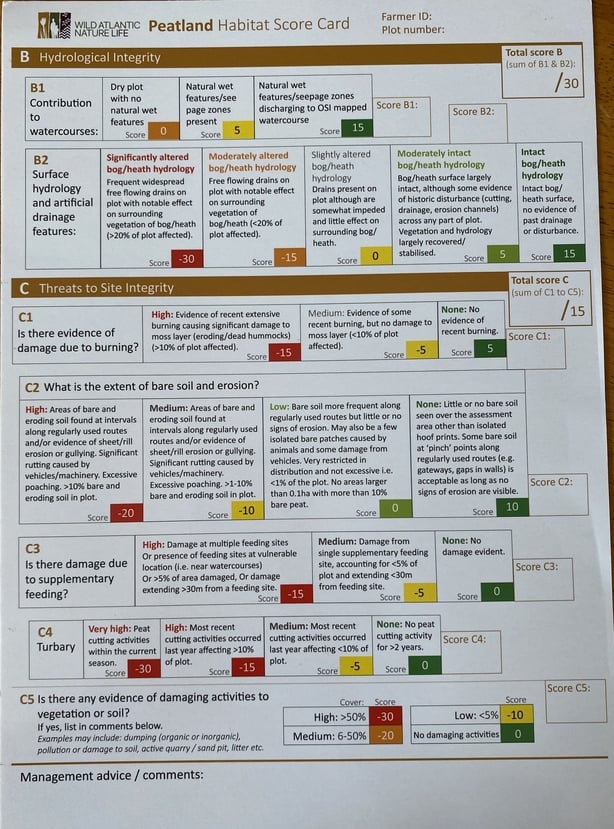Farmers, bogs and nature are a combination that have gone together for centuries but in recent times putting the three words together often means controversy.
A pilot scheme working with farmers whose land includes blanket bog is aiming instead for collaboration, by rewarding farmers for protecting nature, promoting biodiversity, carbon storage and water quality.
The Wild Atlantic Nature Scheme is different to previous agri-environmental schemes which paid a flat rate. It's results-based, so the more a farmer does the more they get paid.
The total payment directly made to farmers for 2022 was in excess of €2.4 million. Payments ranged from €800 to more than €10,000, with an average payment of €3,100.
Gary and Breege Ginty took over his parents' farm in Ballycroy, north of Westport in Co Mayo, ten years ago, and they signed up to the scheme two years ago.
It's a mixed sheep and cattle farm. Gary says this scheme is different: "It’s recognising the type of land that we’re farming, the mountain type land around here, the difficulties in farming it."
Two years in, he's looking at the farm he grew up on with fresh eyes: "We’re starting to recognise the value of our land here, the high nature and environmental value, from a carbon perspective and an ecological perspective."

Derek McLoughlin, Project Manager for the Wild Atlantic Nature scheme, says it focuses primarily on blanket schemes, and includes farms in conservation areas from as far south as the Clare-Galway border right up to north Donegal.
He says farmers have been used to payments that relate to actions such as putting up fences or replacing gates, adding: "This is one whereby we assess the environmental quality of the ground, the peatland, the grasslands and so on. The higher the ecological quality, the higher the score and the higher the payments the farmer receives."
He says the focus is blanket bogs because "they're the highest quality habitats that we have, from a European perspective, they’re like our rainforests here in Ireland. We have about 85% of European blanket bogs".
Each type of habitat is inspected, and points added or deducted according to key indicators. For peatland positive indicators include the presence of native plants including layers of moss, sedge and herbs and shrubs like heather.
The presence of invasive species like brambles, Sitka spruce or rhododendron will see points lost. Recent drainage work can also cost points while an intact bog that stores and filters water is rewarded.
Digging turf on the bog in the last two years can also see a farmer lose points and they are rewarded if there is little or no bare soil on the bog.

The Gintys see their land in a different way since signing up to the scheme.
Breege says: "I suppose you take notice more of what's there. Maybe we mightn’t have always, but you take more notice of what’s around you always now."
That has been helped by a programme in the local schools educating children about biodiversity and helping them identify native plants on the bog. "You’re hearing the kids coming from school with it as well. They’re learning from a young age up. We wouldn’t have that from the young age really," she adds.
Community Engagement Officer for the scheme Vicki MacArthur says concerns from farmers before they signed up included that there might be increased paperwork but "they found there was no paperwork they had to do, apart from fill in the application form. Historically there was a lot of paperwork with other schemes".
Breege grew up on a farm in Bangor, Co Mayo, not too different from the set up in Ballycroy.
She says the environmental stewardship approach promoted by the scheme is not too different to the way they are used to farming. "We were doing a lot as we were anyway, there's maybe a bit more learning to it, which isn’t a bad thing."
Gary says the way his family has farmed for generations has always respected the land. "We always had to work with the type of land we had, we could never abuse it, if you abused it you wouldn't have it.
"I go back to my grandparents’ stage, when they came in here as herdspeople, they settled stock be it sheep or cattle on the side of the mountain. The nature of that land....they could get out if it what it would give to them, so they never abused it."
He respects what they passed onto him and hopes to have something to pass on to the next generation.
"What I'll be passing on some day will be completely different to what I received, because everything has gone more sustainable, environmental, carbon focused, it’ll be a different way of farming. It’ll be environmental farming rather than livestock farming, I think, but there's nothing wrong with that it’s all a management thing. But the big question is, will my family that I pass it on to, be able to make a living off it?"
Breege agrees, and hopes the new agri-environmental approach will help sustain their family farm. "You'd hope maybe that the kids would take it on, if the money is in it, you can’t have something without the money coming into it."







